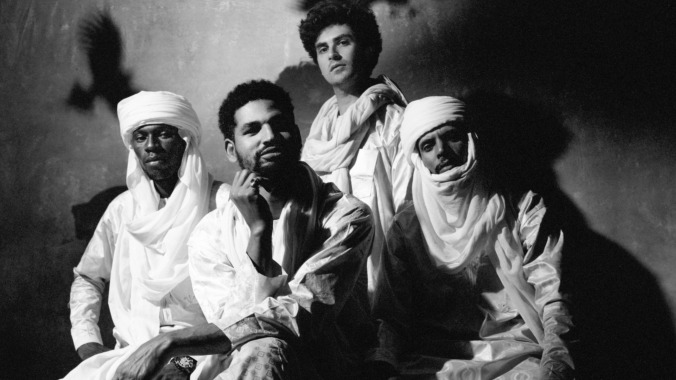Mdou Moctar’s Songs of Protest and Celebration
The Nigerien quartet’s latest album, Funeral for Justice, is a ferocious denouncement of colonialism and a tribute to the enduring Tuareg culture.
Photo by Ebru Yildiz
Mdou Moctar uses his guitar to emulate the sound of a siren. During the recording sessions for Funeral for Justice, his band’s latest album, Moctar inched his hand toward the high edge of his lefty fretboard, using his preferred picking hand to instead conjure a burst of wailing noise. Once they wrapped up tracking it, producer and bassist Mikey Coltun was talking to Moctar about why he did that and what he was feeling in that moment. “This is a cry for help,” the guitarist and vocalist told his bandmate. “This is the sound of the siren.”
The Tuareg musician and bandleader plays the six-stringed instrument like it’s the co-vocalist alongside him. “Guitar is everything for me,” Moctar explains from the Matador Records office in Lower Manhattan via Zoom. “It’s my key to everything.” Most of the lyrics for Funeral for Justice are sung in his native tongue, Tamasheq, but the messaging of the record rings clear despite any potential language barriers and Mdou Moctar’s growing audience in English-speaking countries. Stacked with countless incandescent guitar solos that erupt like fireworks, there’s an underlying urgency to these songs. The guitar may as well be another one of Moctar’s native languages. It’s a vehicle for his convictions.
Funeral for Justice is a roughly 40-minute call to arms with a stalwart anti-colonialist stance. Three of the band’s four members—Moctar, drummer Souleymane Ibrahim and rhythm guitarist Ahmoudou Madassane—are from Niger, a landlocked country in West Africa. Ibrahim and Madassane live in Agadez, and Moctar lives in a remote village in the Saharan Desert. The band’s Nigerien roots mean they are well-acquainted with the insidious colonialism that has spread throughout their home country like a plague. France is a notorious colonial power, and it only recently ceded all of its Nigerien military bases because of a military coup last year. Because of the coup, Moctar and his band were forced to stay in the United States after finishing a North American tour. “I didn’t know what was going to happen,” he recalls. “I was just thinking about my family and how my family would survive. It was a difficult time.”
Although Mdou Moctar wrapped up the recording process of Funeral for Justice in 2022, there’s an added layer of depth to the geopolitical protestations that resound throughout the new album. It may not have been directly informed by it, but it’s evidence of the real threat of colonial occupation, a threat that Mdou Moctar rails against in their music. He clarifies that he doesn’t support the violence of the coup itself, but he acknowledges that it’s a consequence of the French imperialism that afflicted Niger as early as the 1890s. “The coup is not a good way to support the people, so I never supported it,” he says. “At the same time, I never liked France or their colonization. I never liked their system.”
-

-

-

-

-

-

-

-

-

-

-

-

-

-

-

-

-

-

-

-

-

-

-

-

-

-

-

-

-

-

-

-

-

-

-

-

-

-

-

-








































